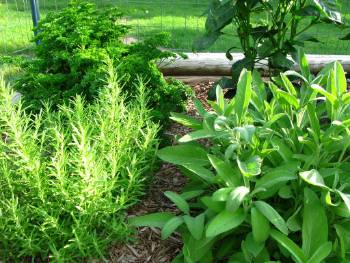How to Grow an Herb Garden
Nashville, Ark. –
How do I grow an herb garden?
Over the last few years herbs have gained popularity for many homeowners. When first starting to grow your own herbs, you might want to start with those that are known to be easy to grow. A few of the annual herbs that are as easy to grow are basil, dill, and cilantro. Some of the easy perennials include chives, rosemary, and thyme. One of the few perks about growing herbs is that they like warm sunny areas that drain well.
Herbs are grown for many different reasons. When deciding what to grow, ask yourself why you are growing them. Is it to cook with or use for landscaping purposes, maybe even both? If you do not want strictly an herb garden, you can mix them in with other landscape plants. Just be sure to not plant them with plants that require pesticide use. Also be careful when choosing a location, if you are planting just herbs as well, so not plant them close to an area that is going to follow a pesticide spray schedule.
When laying out a design for your herb garden a few things to remember is that herbs start out small but do not always stay small. It is important to allow plenty of room for your herbs to continue to grow. Also, if you are trying to decide how many of each plant to plant, it all depends on how big the plant might grow and how much of that certain herb you will use in one growing season. If you produce to much of a certain herb, you can freeze or dry them to use later or share with friends and family.
You can contact me for more information on herb gardens by sending an email to shorn@uada.edu. Howard County Extension office is still working and is there for all the residences in Howard County during this time.
By Samantha Horn
County Extension Agent - Agriculture
The Cooperative Extension Service
U of A System Division of Agriculture
Media Contact: Samantha Horn
County Extension Agent - Agriculture
U of A Division of Agriculture
Cooperative Extension Service
421 N. Main Nashville AR 71852
(870) 845-7517
shorn@uada.edu
Related Links
The Arkansas Cooperative Extension Service is an equal opportunity institution. If
you require a reasonable accommodation to participate or need materials in another
format, please contact your County Extension office (or other appropriate office)
as soon as possible. Dial 711 for Arkansas Relay.
Pursuant to 7 CFR § 15.3, the University of Arkansas System Division of Agriculture
offers all its Extension and Research programs and services (including employment)
without regard to race, color, sex, national origin, religion, age, disability, marital
or veteran status, genetic information, sexual preference, pregnancy or any other
legally protected status, and is an equal opportunity institution.
